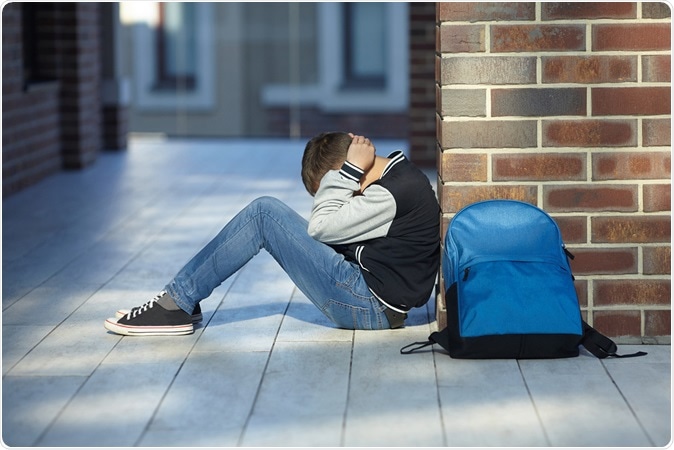In the United States, one in seven children could be suffering from a mental health condition for which half of them do not receive appropriate treatment finds a new study. The results of this eye-opener study were published in the latest issue of the journal JAMA Pediatrics.

Image Credit: Roman Bodnarchuk / Shutterstock
The team of researchers from University of Michigan looked at data from the 2016 National Survey of Children's Health. This was a national survey that was taken by parents of 46.6 million children and adolescents between ages 6 and 18 years. Results showed that 7.7 million children had at least one mental health condition. There were cases of depression, anxiety, attention-deficit/hyperactivity disorder (ADHD), bipolar disorder, eating disorders, body dysmorphic disorders etc. Of these again, only around half received treatment or counselling from a qualified mental health provider in the year prior to the survey.
The report detailed the prevalence of mental health problems among children and found ;
- Hawaii has 7.6 percent children suffering from a mental health condition
- Maine has 27.2 percent children suffering from a mental health condition
- In the District of Columbia 29.5 percent children did not receive appropriate treatment
- In North Carolina 72.2 percent children were left untreated
- The national average of untreated mental health conditions among children is a little over 49 percent
Mark Peterson, associate professor at University of Michigan Medicine and lead author of the study, in a statement said he did not expect such high numbers, having studied mental health for years. This finding however did not surprise child and adolescent psychiatrists and psychologists. Experts in the field have agreed to have seen similar numbers in their practices.
Jennifer Mautone, psychologist in the Department of Child and Adolescent Psychiatry and Behavioral Sciences at the Children's Hospital of Philadelphia said that there are problems of social stigma that prevents families from seeking help, advice and support. Coverage too is an issue she said. The American Academy of Child and Adolescent Psychiatry also cites the problems of availability of practicing child and adolescent psychiatrists (less than 17 available per 100,000 children). There are long wait times, say experts. This leads to worsening of the condition and also need for long term treatment says Mautone. “Mental health disorders are certainly stigmatised conditions and can be very debilitating in terms of healthful growth, especially for children and adolescents,” said study co-author Daniel Whitney of the University of Michigan.
According to authors and experts in the field, another challenge is communicating with the education system, juvenile justice system, child welfare system and health care system that look after the interest of children and teenagers. Mautone said in her statement, “All of these systems that are supposed to be caring for children often times are not talking to each other. A lot of times kids fall through the cracks and families are not getting the appropriate support they need.” Mautone leads the Healthy Minds, Healthy Kids Initiative at the Children's Hospital of Philadelphia that provides support where needed.
The study authors wrote, “In children, mental health disorders have deleterious consequences on individual and socioeconomic factors and can impede healthful transitioning into adulthood, and the incidence of mental health disorders has been increasing over the decades.” They concluded, “Initiatives that assist systems of care coordination have demonstrated a reduction of mental health–related burdens across multiple domains.”